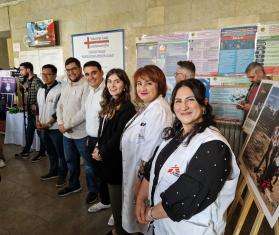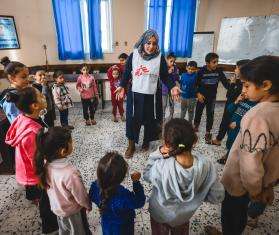Overview of MSF Operations to Assist Victims of the Tsunami
31 January 2005 - A little over one month after the tsunami hit Southeast Asia, Doctors Without Borders/Médecins Sans Frontières (MSF) is publishing a detailed report of its emergency relief activities to assist the victims of the disaster. Since the beginning of the crisis, over 200 international MSF volunteers and 2,000 metric tons of supplies have been sent to the region. Today, 127 international volunteers are helping in Aceh, Indonesia, 36 in Sri Lanka, and 6 in India, working side by side with national staff.
Within 72 hours after the tsunami, the first MSF teams arrived in the affected areas. After initial assessments of needs, MSF decided to mainly focus its relief efforts on northern Sumatra and the southern, eastern and northern coastal areas of Sri Lanka. In Thailand, MSF donated medical material to several hospitals in the province of Phang Na and decided to start a program aimed at helping Burmese migrants, 5000 of which have gone missing following the tsunami, get better access to health care. In southern India, MSF is starting psychosocial support programs as psychological trauma was found to be a serious problem within the affected communities. Assessments on the Andaman islands showed no need to intervene given the fast mobilization of local medical staff and relief. In Myanmar and Malaysia, MSF assessments concluded that there were no serious unmet medical needs amongst the population.
In Aceh and in Sri Lanka, the catastrophe resulted in a huge number of deaths as well as massive material destruction. Indonesian and Sri Lankan health authorities and aid organizations were rapidly deployed to deliver assistance to survivors. MSF's activities were organized alongside the aid provided by the health authorities and other aid organizations. MSF's efforts included: supporting local health structures and running mobile clinics; setting up emergency water and sanitation systems where displaced people were gathering, and providing essential relief items. Psychosocial assistance has also been a key component of MSF's response to the disaster in both countries. In Indonesia, where MSF volunteers carried out more than 15,000 medical consultations in January, MSF also responded to the appearance of tetanus by supporting care to those affected and providing tetanus awareness information and vaccinations to others at risk.
No epidemics have occurred in Sri Lanka or Indonesia, although in Indonesia the risk remains real due to poor hygiene conditions in some locations and low vaccination coverage. Evaluations done in different displacement camps in Aceh show that despite the massive mobilization of international aid, urgent needs remain. MSF's efforts to provide relief supplies, access to adequate medical care, psychosocial support, and improved water and sanitation to families continue. MSF teams are also continuing to evaluate ways to provide the most appropriate assistance to help families severely affected by the tsunami regain their independence.
Thanks to the unprecedented generosity of its donors, MSF received more than $117 million internationally to assist those affected by the disaster. To date more than $13 million has already been spent, including $10 million in Indonesia, and, in total, nearly $32 million has been earmarked and budgeted for MSF's first operational phase currently underway. MSF is committed to continuing to assist tsunami victims in Aceh and in other affected regions in the future. However, donations earmarked for tsunami relief efforts received by MSF surpass our foreseen financial requirements. MSF has already begun contacting donors to seek their permission to derestrict their contributions in order to help MSF respond to other emergencies such as those in the Darfur region of Sudan or the Democratic Republic of Congo. Donations will be reimbursed if so requested.



